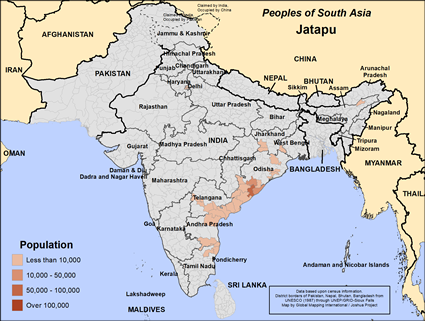The Jatapu have no deep history or heritage, though they were traditionally pastoral farmers. Many have even forgotten their original language, Jatapu, and they have adopted Telugu as their mother tongue. The Jatapu are among what the Indian government calls the "scheduled tribes. " Most scheduled tribes are underdeveloped economically, so the Indian government has attempted to bring them into the mainstream of political and economic life. These tribes were "scheduled" for special treatment. However, the Jatapu people are doing far better economically than other people groups in this category. The Jatapu are in the hills of central India. They are mainly concentrated in the Srikakulam and Visadhapatnam districts of Andhra Pradesh, although there are some Jatapu communities in the state of Odisha.
As a people, the Jatapu are developing both materially and politically. Some own fertile lands and rich forests, and possess more wealth in cash, jewelry and property than their neighbors. In addition, some hold local government positions. They are now aspiring to higher district and legislative positions. In general, the Jatapu have a friendly, considerate spirit that prevails at all times. They are exceptionally clean, and most Jatapu men are loving fathers. The Jatapu predominantly work as farmers and forest laborers. Rice is their staple crop, but they also grow grains, peas, beans, chilies, and tobacco. In addition, they collect and sell minor forest produce. A few Jatapu sell pottery, baskets, or bangles, but very few work as craftsmen. They generally do not spin, weave, make pottery, or work as carpenters. A typical Jatapu village consists of mud houses lined in rows. The homes are joined to each other with common outer walls and a thatched roof. There are usually four separate rooms in each house to provide privacy. The homes have very few possessions, mainly earthen pots, baskets for grains, and mats for sitting. There is no bedding material; they stay warm in the winter by burning fires. The village street serves as a courtyard and playground. Cattle are either kept in sheds or tied to posts in the middle of the streets to avoid cattle theft. They always keep their streets tidy. Among the Jatapu, lineage is patrilineal (traced through the males) and leadership always rests with the men. However, the women enjoy equal status with men and share in family decisions. Boys begin working in the fields and forests at the age of five. Women rear the children, draw water, cook, clean, and keep the house. They take special care of their hair and use artificial hair pieces that they buy in the markets. Women put their hair in a bun using shining black tassels. They also enjoy wearing necklaces, bangle bracelets, several nose rings, and many earrings. Among the Jatapu, there are three types of marriages: by consent, by elopement, and by bride-service (the groom works for the bride's parents). The Jatapu only marry within their own tribe, but never within the same clan (extended family). They prefer to live as nuclear families (husband, wife, and their children); however, some live as extended families.
The Jatapu are virtually all Hindu. The only local god of the Jatapu is Jakeramma, who has one shrine in each village. Surprisingly there are no sayings, folk beliefs or taboos among the Jatapu. They have hardly any myths about jungle gods, spirits or ghosts. There are no idols and sacred places of worship in their homes. They offer buffalo in animal sacrifices, but do not eat its meat.
Most of these precious people have not yet heard a clear presentation of the gospel. Their focus on the family and fatherly love has already prepared their hearts to understand the Heavenly Father's love for them. They simply need to hear the truth. Compassionate Christians are needed to minister Life and love to the Jatapu.
Pray the hearts of the Jatapu people would be stirred to hunger after God, to drink of living water. Pray for family-based Christ-ward movements to soon transform Jatapu society, blessing them spiritually and economically. Pray for the Lord to move in the hearts of believers to give up their own rights and sacrifice their lives to see the Jatapu people blessed by the work of Jesus Christ, the only Savior.
Scripture Prayers for the Jatapu in India.
| Profile Source: Joshua Project |











